Monday Mar 02, 2026
Monday Mar 02, 2026
Thursday, 14 September 2023 00:36 - - {{hitsCtrl.values.hits}}
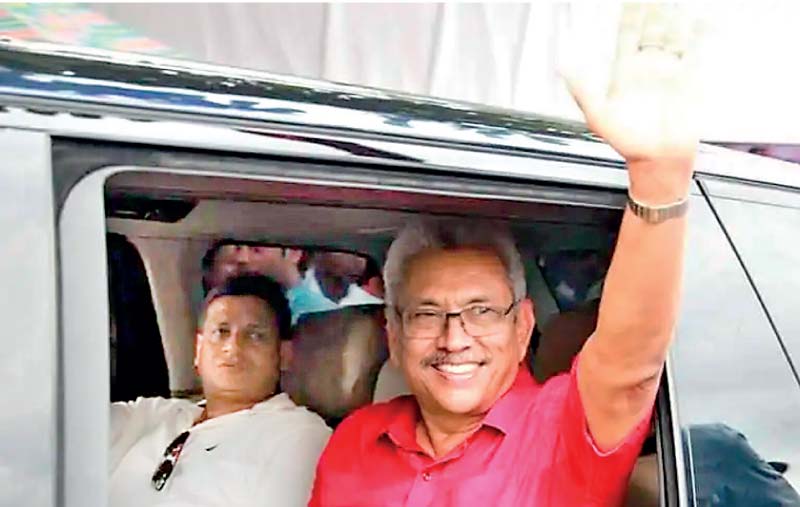
Gotabaya and political heir
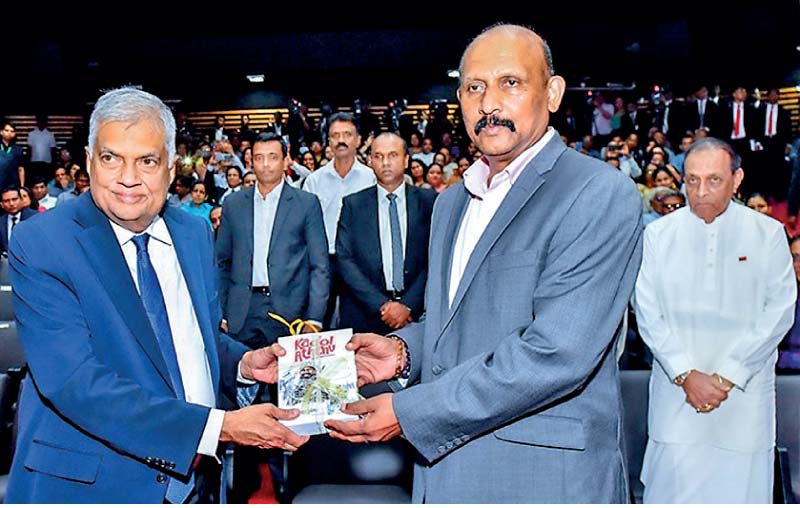
Autocratic axis
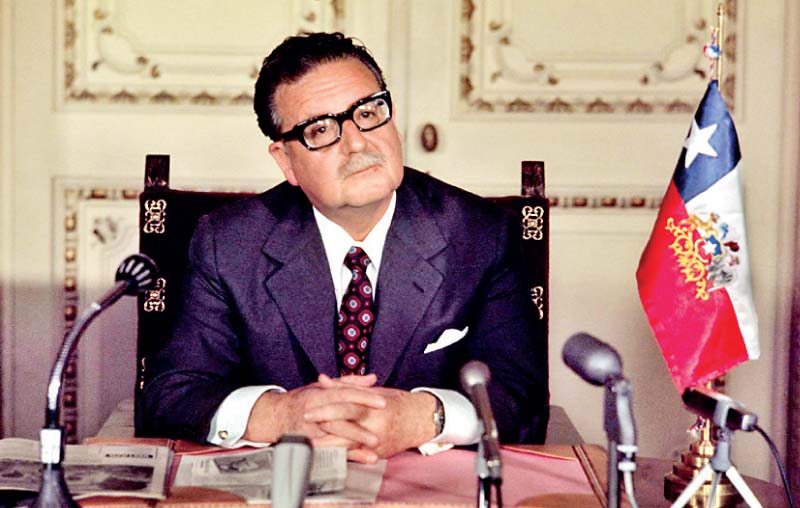
Chilean President Salvador Allende, ousted 1973
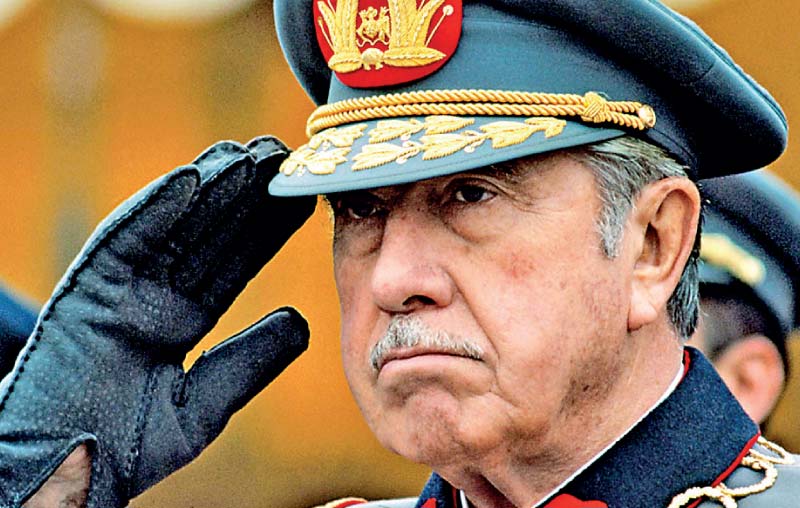
Pinochet seized power in 1973
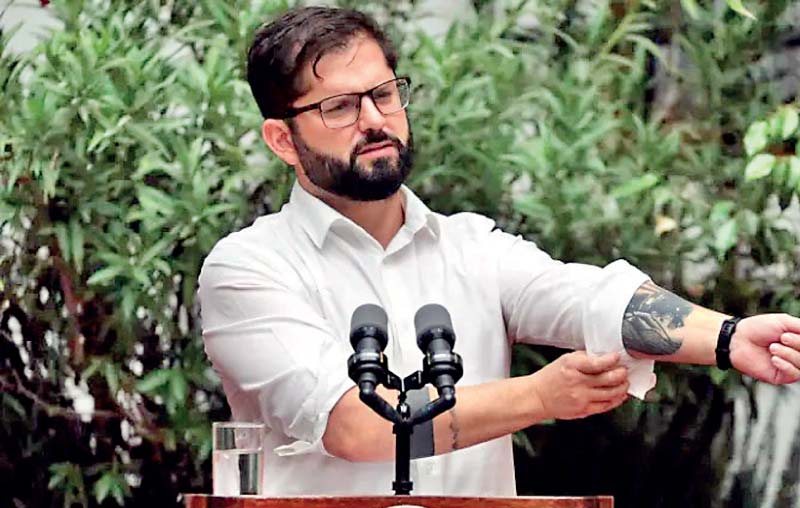
Chile’s leftist President Gabriel Boric, 37
“But if the watchman sees the sword coming and does not blow the trumpet to warn the people and the sword comes and takes someone’s life…I will hold the watchman accountable for their blood.”
– Ezekiel 33, The Bible
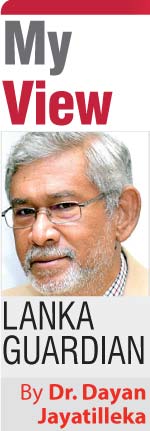 Let alone who killed him, the State institutions still cannot tell the magistrate whether or not well-known young businessman Dinesh Schaffter was murdered, and how. The DNA results aren’t in yet. Many months ago, he was found in his car at the public cemetery in broad daylight, with flexicuffs attaching his neck to his steering wheel.
Let alone who killed him, the State institutions still cannot tell the magistrate whether or not well-known young businessman Dinesh Schaffter was murdered, and how. The DNA results aren’t in yet. Many months ago, he was found in his car at the public cemetery in broad daylight, with flexicuffs attaching his neck to his steering wheel.
So, it is wildly illogical to assume that under the Wickremesinghe administration, any inquiry can reveal the truth about the Easter massacre.
It is bitterly ironic to see Sinhala ultranationalists led by a resurgent Gotabaya Rajapaksa shriek hysterically about the new Channel 4 documentary on the Easter massacre, though their passionate patriotism has not led any of them to squeak about President Ranil Wickremesinghe’s ongoing project to hand over the Trincomalee Port, Trincomalee District and the Eastern Province to India while building a land-bridge linking the island’s North and East to Tamil Nadu.
It is no less ironic that those who had no problem with the jailing of their war-winning commander, Field Marshal Sarath Fonseka, and who criticise Gen. Shavendra Silva for not massacring unarmed kids during the Aragalaya, are motivated to mount a charge at a British TV production in defence of a brother officer who could simply sue Channel 4.
I’d like to see a TV documentary on the Rathupaswela and Welikada massacres, and an impartial inquiry into them.
|
Victor Jara, murdered 16 Sept. 1973
|
Gota’s got gaps
While Mahinda Rajapaksa was one of the best presidents we ever had, Gotabaya was easily the very worst president we ever had.
Despite his lapses Mahinda was and is far more intelligent than all his siblings put together. When asked about the most decisive factor in his success against the LTTE in the course of a live interview with an Indian journalist who may have been Padma Rao or Suhashini Haidar, Mahinda replied spontaneously, avoiding self-glorification and saying instead that Prabhakaran had made a decisive blunder, opting to fight the State as a conventional force, instead of dismantling his forces into columns and returning to guerrilla warfare.
Gotabaya has just made the same blunder that Mahinda said Prabhakaran did. Instead of allowing his lawyers to do the talking about the new Channel 4 documentary, Gotabaya has come out into the open with a confrontational, self-righteous four-page statement on his letterhead and under his signature. He is boxing the Rajapaksa clan into a political Nandikadal.
What is most glaring about Gotabaya’s statement is what he chooses to stay silent about.
 The most serious charge directly levelled against Gotabaya Rajapaksa in the latest Channel 4 documentary pertains to the murder of Lasantha Wickrematunge. The testimony of the triangulation of phones calls pointing to the so-called Tripoli unit comes from Nishantha de Silva, a senior CID investigator. Gota isn’t covered by Presidential immunity on this matter because he was the Secretary/Defence and not the President when the crime was committed. In his exhaustive 4-page statement, Gotabaya doesn’t have a word to say about the Channel 4 charge concerning the Lasantha murder, the Tripoli unit, etc.
The most serious charge directly levelled against Gotabaya Rajapaksa in the latest Channel 4 documentary pertains to the murder of Lasantha Wickrematunge. The testimony of the triangulation of phones calls pointing to the so-called Tripoli unit comes from Nishantha de Silva, a senior CID investigator. Gota isn’t covered by Presidential immunity on this matter because he was the Secretary/Defence and not the President when the crime was committed. In his exhaustive 4-page statement, Gotabaya doesn’t have a word to say about the Channel 4 charge concerning the Lasantha murder, the Tripoli unit, etc.
 Gotabaya is silent about what he did—if anything-- upon assumption of the Presidency, to investigate why the Indian intelligence warnings had been ignored by several members of the security/intelligence community. Did or didn’t he reach out to the highest Indian security authorities on the matter? If so who, and if not why not? Wasn’t he infuriated by the grotesque lapse of the Lankan security officials as he tends to be about much lesser lapses? Didn’t he want to yell at them as he did at Frederica Jansz? Gotabaya has an excellent critique about the permissive, enabling security environment under Yahapalanaya, but what action did he take to investigate and punish those responsible for this monstrous and inexplicable ‘lapse’, which cost hundreds of innocent lives; a ‘lapse’ in the absence of which all those lives would’ve been saved?
Gotabaya is silent about what he did—if anything-- upon assumption of the Presidency, to investigate why the Indian intelligence warnings had been ignored by several members of the security/intelligence community. Did or didn’t he reach out to the highest Indian security authorities on the matter? If so who, and if not why not? Wasn’t he infuriated by the grotesque lapse of the Lankan security officials as he tends to be about much lesser lapses? Didn’t he want to yell at them as he did at Frederica Jansz? Gotabaya has an excellent critique about the permissive, enabling security environment under Yahapalanaya, but what action did he take to investigate and punish those responsible for this monstrous and inexplicable ‘lapse’, which cost hundreds of innocent lives; a ‘lapse’ in the absence of which all those lives would’ve been saved?
 Why didn’t President Gotabaya ascertain why an intelligence officer met one of the suicide bombers on his way back from a target he didn’t explode himself at, but didn’t try to neutralise him (using a special unit as backup perhaps), and instead allowed him to go free to explode himself at another target? How did the intelligence officer even know this suicide bomber? Didn’t it cause curiosity in the decorated ex-officer and former Secretary/Defence?
Why didn’t President Gotabaya ascertain why an intelligence officer met one of the suicide bombers on his way back from a target he didn’t explode himself at, but didn’t try to neutralise him (using a special unit as backup perhaps), and instead allowed him to go free to explode himself at another target? How did the intelligence officer even know this suicide bomber? Didn’t it cause curiosity in the decorated ex-officer and former Secretary/Defence?
 Did Gotabaya Rajapaksa check why intelligence personnel allegedly interrupted the questioning by the CID of an intelligence officer who had either conversed with the bomber or made a telephone call overseas seeking to contact a shadowy source in East Asia? Why did intelligence personnel take away their colleague saying the interrogation impinged on an intelligence operation? What was that operation and who was the intelligence operative who was taken away? Who were the two intelligence operatives who took him away? Who gave them the order to do so? What did President Gotabaya do to ascertain the facts, and what did he do with those facts?
Did Gotabaya Rajapaksa check why intelligence personnel allegedly interrupted the questioning by the CID of an intelligence officer who had either conversed with the bomber or made a telephone call overseas seeking to contact a shadowy source in East Asia? Why did intelligence personnel take away their colleague saying the interrogation impinged on an intelligence operation? What was that operation and who was the intelligence operative who was taken away? Who were the two intelligence operatives who took him away? Who gave them the order to do so? What did President Gotabaya do to ascertain the facts, and what did he do with those facts?
GR and the Rajapaksa legacy
Gotabaya’s lengthy statement concludes that:
“…This latest film by Channel 4 is mostly an anti-Rajapaksa tirade aimed at blackening the Rajapaksa legacy from 2005 onwards…”
If Gotabaya is concerned about an “anti-Rajapaksa tirade”, he should reflect on the following:
 The biggest and longest “anti-Rajapaksa tirade” including the slogan that he was certifiably insane (“Gota pissek”), the frequent blowing of car-horns to a tune about one of his brothers as a crow, and the insults at Mahinda terming him an “aged Myna”, came from almost a million people, spanning several months starting from Gotabaya’s doorstep at Mirihana on 31 March 2022, not because they were Channel 4 viewers. The “anti-Rajapaksa tirade”, local and global, came from Sri Lankan citizens, mainly youth, domiciled in this country, and from Sri Lankan-born citizens overseas ranging from New Zealand and Estonia to all 50 states of the USA, because of Gotabaya’s cruel policies and outrageous arrogance.
The biggest and longest “anti-Rajapaksa tirade” including the slogan that he was certifiably insane (“Gota pissek”), the frequent blowing of car-horns to a tune about one of his brothers as a crow, and the insults at Mahinda terming him an “aged Myna”, came from almost a million people, spanning several months starting from Gotabaya’s doorstep at Mirihana on 31 March 2022, not because they were Channel 4 viewers. The “anti-Rajapaksa tirade”, local and global, came from Sri Lankan citizens, mainly youth, domiciled in this country, and from Sri Lankan-born citizens overseas ranging from New Zealand and Estonia to all 50 states of the USA, because of Gotabaya’s cruel policies and outrageous arrogance.
 If the latest Channel 4 film is “aimed at blackening the Rajapaksa legacy from 2005 onwards”, its efforts run a poor second to Gotabaya’s own. The marchers who were stopped at Police barricades in Hambantota while proceeding in the direction of Medamulana, and those who pulled down the monuments to Mahinda and Gotabaya’s father, were not Channel 4 viewers. They were Sinhala Southerners who had voted for decades for the Rajapaksas. They turned against the Rajapaksas despite the Rajapaksa legacy including Mahinda’s legacy from 2005, because their traditional livelihood, agriculture, had been destroyed by Gotabaya’s lunatic overnight countrywide ban on chemical fertiliser, weedicide and pesticides. The urban demonstrations were triggered by the doctored gas canisters lethally exploding in kitchens.
If the latest Channel 4 film is “aimed at blackening the Rajapaksa legacy from 2005 onwards”, its efforts run a poor second to Gotabaya’s own. The marchers who were stopped at Police barricades in Hambantota while proceeding in the direction of Medamulana, and those who pulled down the monuments to Mahinda and Gotabaya’s father, were not Channel 4 viewers. They were Sinhala Southerners who had voted for decades for the Rajapaksas. They turned against the Rajapaksas despite the Rajapaksa legacy including Mahinda’s legacy from 2005, because their traditional livelihood, agriculture, had been destroyed by Gotabaya’s lunatic overnight countrywide ban on chemical fertiliser, weedicide and pesticides. The urban demonstrations were triggered by the doctored gas canisters lethally exploding in kitchens.
 Gotabaya has “blackened the Rajapaksa legacy from 2005 onward” to such an extent that it is a question as to whether any Rajapaksa will make it to the next Parliament, and how many years (decades) it will be before a Rajapaksa makes it back to Parliament including from the Ruhuna.
Gotabaya has “blackened the Rajapaksa legacy from 2005 onward” to such an extent that it is a question as to whether any Rajapaksa will make it to the next Parliament, and how many years (decades) it will be before a Rajapaksa makes it back to Parliament including from the Ruhuna.
 If “the Rajapaksa legacy from 2005” was so precious to Gotabaya Rajapaksa, why did he remove the powers of the PM and transfer them to himself when Mahinda Rajapaksa who established “the Rajapaksa legacy from 2005” was the very PM from whom an utterly ungrateful Gotabaya as newbie President appropriated the power?
If “the Rajapaksa legacy from 2005” was so precious to Gotabaya Rajapaksa, why did he remove the powers of the PM and transfer them to himself when Mahinda Rajapaksa who established “the Rajapaksa legacy from 2005” was the very PM from whom an utterly ungrateful Gotabaya as newbie President appropriated the power?
MoD offensive
The Defence Ministry charged headlong into a minefield by launching a detailed statement instead of a minimalist one on the Channel 4 documentary.
It fails to explain the following:
(a) Ignoring of Indian intelligence warnings by ranking security/intelligence personnel, which resulted in an avoidable massacre of innocents.
(b) Meetings between an alleged military intelligence officer (or officers) and one of the suicide-bombers on the day of the massacre.
(c) Subsequent interference in the CID investigations by taking away an intelligence operative being questioned.
The statement contains a diaphanously veiled, outrageous and unenforceable threat:
“…Channel 4’s myopic and malevolent conduct not only imperils the very fabric of Sri Lankan society by sowing seeds of discord but also shamelessly jeopardizes the reputation and safety of those who have resolutely upheld their integrity and responsibility… the Ministry of Defence emphatically asserts that Channel 4 will be held unequivocally accountable for any unforeseen actions or repercussions stemming from their unfounded, malevolent, and poorly substantiated claims made in the video documentary.”
The statement asserts:
“On behalf of the Government of Sri Lanka, the Ministry of Defence hereby categorically refutes these false allegations and reiterates the government’s unwavering commitment to the truth, justice and the well-being of the Nation.”
The Ministry of Defence DOES NOT speak “on behalf of the Government of Sri Lanka”. Sri Lanka being a representative democracy and the Government of Sri Lanka being a representative democratic government, the President, the PM, the Cabinet and designated spokespersons do.
The MoD does not speak on behalf of the Government of Sri Lanka especially when it pertains to matters with an international dimension. Channel 4 is a UK-based and owned international media organisation. The Ministry of Foreign Affairs does. The MoD statement reflects the old Gotabayan mindset that the MoD helms the Sri Lankan state and dominates all its activities including the international.
The strongest point in Gotabaya’s and the MoD statements is that Salley was in Malaysia and India during the two periods mentioned (2018, 2019). Gen Salley’s former commander, Field Marshal Sarath Fonseka scornfully rebuts it in Parliament saying that a trained intelligence operative and senior intelligence official could easily secure the necessary paperwork and identities to slip in and out of countries undetected had he wished to do so.
This doesn’t mean Gen. Salley did it. His main weakness seems to have been that he was an overly loyal adherent of Gotabaya Rajapaksa and may not have defied any order however illegal. He seems the kind of guy who takes one for the team. Or Salley may have a waterproof alibi which makes the trail run dry while diverting attention from others, giving them a chance to go to ground (possibly overseas).
Admittedly, Field Marshal Fonseka always did have an issue with the Directorate of Military Intelligence, though one cannot tell whether he was right to do so. During the controversies over the Lasantha killing, the ‘white flag’ massacre, etc., the war-winning Army chief used to complain that he had no direct command over Intelligence during wartime and that Gotabaya ran it directly through the formidable Chief of National Intelligence, General Kapila Hendawitharana, GR loyalist and Suresh Salley’s wartime boss.
Chile 1973, Sri Lanka 2023/4
This week, Chile and the Organization of American States (OAS) commemorated the military coup of 11 September 1973 which overthrew democratically elected President Salvador Allende 50 years ago, ending with his death, and erected a bloody dictatorship practising Milton Friedman and the Chicago Boys’ economics.
On 16 Sept 1973, iconic singer-songwriter Victor Jara had his guitar-playing hands broken and was shot 44 times by the military in the Santiago Sports Stadium. (Manifiesto (Victor Jara) with English Subtitles - YouTube)
Nobel Prize winning poet Pablo Neruda, described by Gabriel Garcia Marquez as the greatest poet of the 20th century in any language, died suspiciously in hospital within the month of September ‘73.
This Monday, Chile’s leftwing president Gabriel Boric (37), a former student leader of an unarmed but powerful uprising in 2018-19, a ‘socioeconomic Aragalaya’ against the results of neoliberalism, was flanked by the Presidents of Mexico, Bolivia, Colombia and Uruguay when he spoke at a solemn ceremony condemning dictatorship and celebrating Allende.
The predatory neoliberal economic model installed by Pinochet after the 1973 coup has already been implanted under Ranil. In Chile, it took a dictatorship to install the economic model. In Sri Lanka it took an unelected President to install it and may take a dictatorship to implement it. In Chile, dictatorship preceded the economic model. In Sri Lanka, dictatorship may follow in its wake, given the logic of political economy.
Within the Jayewardene administration Ranil was a pronouncedly authoritarian-Rightist prone to the deployment of violence, both ‘gangster’ (Christopher Jayatilaka, Gonawela Sunil, Kalu Lucky) and military (Batalanda). Gota picked him as PM and positioned him as successor while fleeing the Aragalaya. Ranil and Gota are closely connected to the US Republican Right, as is their buddy Moragoda. Symbiotically linked, Ranil-Gota are two faces of one coin.
There is an interface of two sets of drives, projects, agencies:
1. The neoliberal/neoconservative Ranil camp which wants to drive through its extreme economic program including labour and land law abolition and Indianising the Eastern Province without the ‘distraction’ of an election next year. (Sri Lanka must not allow elections to distract from stabilisation: ex-central bank chief | EconomyNext) As Eduardo Galeano, the great Latin American writer bitterly concluded: “In our part of the world, Adam Smith needs Mussolini” (‘Cemetery of Words’).
2. The ultranationalist, proto-fascist Gotabayan camp, ranging from upper securocracy to new political party, which is ideologically antipathic to democratic elections and apprehensive about accountability under a new administration.
Surpassing even the Indonesian coup of 1965, the Chilean coup of 1973 was a collective trauma, a wound as well as a portal in the consciousness of generations of leftists and progressives the world over. The lessons of Chile must be learned.
A. However peaceful a country’s Left, however clear the democratic mandate of an elected left administration, when the Right, especially if backstopped by the global or regional hegemon, feels its interests potentially threatened by democratic elections and their (possible) results, the mask of constitutionalism is abandoned and democracy drowned in a bloodbath, installing a military junta or as in Uruguay’s ‘State of Siege’ (also 1973), a ‘civil-military’ junta initiated by the President and endorsed by Parliament.
B. The defence of democracy, preventing the slide to dictatorship, and the transition back from dictatorship to democracy, require dynamic popular mobilization on a massive scale; the broadest united front of left and democratic political currents—broad enough to ensure a massive majority and govern with stability after an electoral victory; the widest multi-sectoral ‘popular bloc’ of grassroots social movements; and exceptionally, the element of armed resistance. In Brazil, no Carlos Marighella, no Lula. In Chile, no Miguel Enriquez and MIR, no FPMR, no Referendum, no Gabriel Boric.
At the World Festival of Youth and Students in Moscow in July-August 1985, I talked with intense, passionate young delegates of the Manuel Rodriguez Patriotic Front (FPMR) which made the abortive attempt on Pinochet the next year, in September 1986, triggering massive state repression during an economic crisis, Pinochet’s defeat at the Referendum in 1988, and ouster at the election in 1990.
Two years after the FPMR’s self-sacrificial intervention, an ironclad dictatorship lost a Referendum; four years after their 1986 martyrdom, Pinochet, a bloody tyrant for 17 years was defeated, reinstating democracy and opening ‘broad avenues’ (Salvador Allende’s phrase in his last speech) for democratic socialist Allende’s young heir Gabriel Boric to lead Chile.